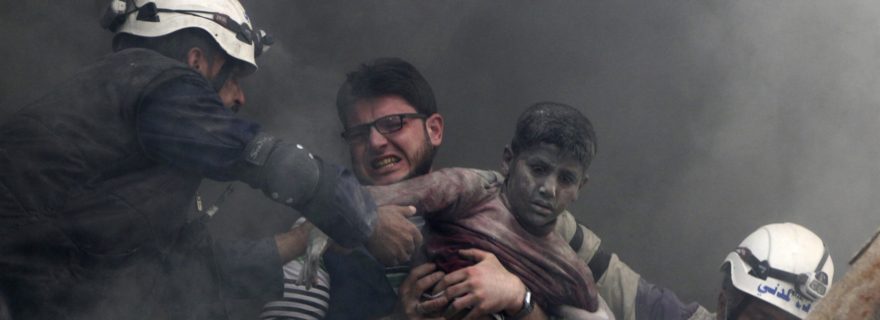'Last Men in Aleppo'
Movie Rating:
4
Possibly the most harrowing and powerful part of Feras Fayyad’s documentary ‘Last Men in Aleppo’ is how banal it can seem at times. Don’t get me wrong, the film is far from boring. This intimate documentary about volunteer rescue workers constantly digging through the rubble of the Syrian Civil War and pulling out the bodies of innocent citizens caught in the crossfire is gripping stuff almost impossible to tear your eyes from.
What makes it so distressingly poignant is that, after a while, watching the constant waves of meaningless destruction, bombs blasting, and bodies being dragged starts to feel commonplace, as it is for the men who sadly do this day in and day out. The only difference on the days the doc was shot was the presence of the cameras.
Fayyad’s grueling documentary focuses on a group known as The White Helmets. They’re a collection of civilian first responders who take their lives into their own hands to dive into the crumbling city structures after recent air strikes and pull their fellow citizens out of the wreckage. It’s noble work, but has stretched on for so long that it has become depressingly routine. A handful of the brave souls wander in and out of Fayyad’s carefully and humanely composed frames, but the most instantly lovable and consistently displayed is Khaled Omar Harah.
Khaled still has some of his sense of humor and hope left. Even when taking his daughter to one of Aleppo’s few remaining pharmacies (after glancing above at the sound of jets with eerie calm) only to find that there aren’t even vitamins left to help with her malnourishment, he speaks of why he wants to stay in the city. He’s torn, of course, but hopes to set an example for future generations and keep life flourishing in a city caught in a cycle of unpredictable violence. When he pulls a baby out of a collapsed building just moments later, he does so with the same dazed expression of routine as a McDonald’s worker cranking out another Big Mac might. He’s committed, but has done it so often that his actions are almost muscle memory at this point. That shouldn’t be possible. It cuts deep without words.
The film continues following Khaled and others through this dreary nightmare. Sometimes it follows them home, other times not. The repetition is endless – rounds of explosions, trips to the rubble, saving lives, and pulling out corpses. Day after day. By the end, the footage of airstrikes and explosions barely even shocks anymore. It’s just yet another spin of the cycle. It’s easy to admire the resolve and strength of all the noble souls who do this work. Occasionally, we get a brief break from the pain and suffering where the cameras will follow the men playing a soccer game or attending a wedding. However, a sense of dread hangs over every moment of calm. The next blast is inevitable. None of this will stop. Fayyad’s structure might be fly-on-the-wall observation, but the symbolism is clear. A larger point is being made.
‘Last Men in Aleppo’ is a remarkable and deeply unsettling work from a talented and impassioned filmmaker. It’s been claimed that he needed to sneak the footage out of the country before editing. That’s likely true given that Fayyad was imprisoned and tortured for documenting the uprising before the war. Somehow, despite the physical danger of the production and his desire to sit back and observe, Fayyad creates a series of unforgettable and meaningful images. The documentary is as brilliantly constructed as it is potent and disturbing. It’s no surprise that the film is up for an Oscar nomination or that it already won top honors at film festivals. This is vital filmmaking, not easy to watch but still important to consume.



